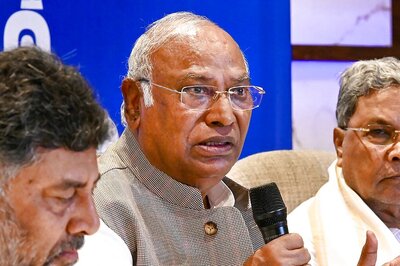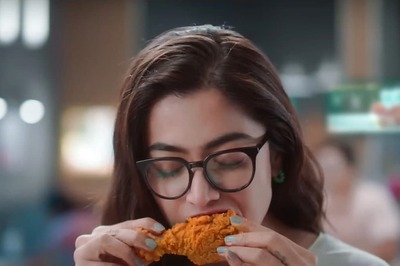
views
Fans. Frenzy. Fanaticism. Virat Kohli’s recent revelation about his leaked hotel room video points toward all three and the slow death of privacy. Although celebrities are also accorded the same rights to privacy as every other individual, we often tend to forget that due to their heavily publicised lifestyles.
Kohli, who is in Australia for the T20 World Cup, was left “paranoid” after a stranger filmed his hotel room at Crown Resorts, Perth, and published it on social media. The star cricketer shared the video titled ‘King Kohli’s Hotel Room’ on his Instagram and condemned the “absolute invasion of privacy.” The hotel has since apologised for the incident and released a statement that mentioned that the employees concerned were fired and an investigation was subsequently launched.
Kohli asked, “If I cannot have privacy in my own hotel room, then where can I really expect any personal space at all?,” which was a legitimate question- one that raised the reality of celebrities being hounded on the streets, hotels, and even their homes for juicy pieces of gossip that are readily lapped up by the masses.
Celebrities’ Rights vs Privacy
Being married to Bollywood actress Anushka Sharma, Kohli is not new to fan frenzy. Kohli has effectively used social media to build a connect with his fans, selectively giving access to the parts of his life that he wished to share. The couple has shielded daughter Vamika from the spotlight and set clear rules on the paparazzi not photographing her.
After Vamika’s birth in 2021, her parents had put out a tweet requesting privacy for their child. Yes, as ‘regular human parents’ and not celebrities. “While we will always ensure that you get all the content you need featuring us, we would request you to kindly not take or carry any content that has our child.”
Despite the multiple requests and clashes with the press, including in 2021 when cameras focused on Vamika’s face during an India-South Africa series, some still cannot comprehend the concept of privacy. Fans assume a sort of ownership over their favourite celebrities who have chosen a “public” life, thus they feel entitled to all their private moments too.
In Kohli’s case, it wasn’t a pap who earned a livelihood from clicking pictures of the star’s life, but rather a random person who was perhaps seeking his 15 minutes of fame or showing off to his friends or even one among the million admirers of King Kohli, that intruded into his guarded space.
The things spotted in Kohli’s room tour – spiritual idols, footwear, a suitcase full of clothes – are not so different from a typical room, except for the Team India jerseys. It’s not so difficult to understand which line was crossed if each of us could imagine our private spaces being exposed to a prying world, right from the clutter of clothes to the personal diary safely kept on the bedside table.
As celebrities are seen as an object for entertainment rather than as a human with emotions, fans and paparazzi constantly trespass the moral boundaries. As explained by James Houran, a psychologist, to livescience.com, there are three stages of fandom – from indulging in celebrity gossip to compulsive behaviour and finally the “borderline pathological” stage, where the person believes they are in a deep relationship with the celebrity.
However, many believe that the relentless paparazzi and dangerous stalkers have to be accepted as part and parcel of being a known figure, which they chose to be. But no, celebrities haven’t signed away their right to privacy when opting for a profession in the limelight.
How much publicity is too much publicity?
Lights. Camera. Vultures. Celebrity culture involves documenting their every sneeze and meal in order to prove that they, too, are – breaking news – ‘normal’! Celebrities are worshipped and criticised in the same breath with each of their actions being scrutinised and dissected in public discourse.
Whether it be Deepika Padukone without makeup, Janhvi Kapoor spotted with a mystery man, or Taimur’s cheat meal, Indian media has ensured that the public is fed a daily dose of entertainment in whatever form available. The vilification and public media trial of Rhea Chakraborty in the Sushant Singh Rajput suicide case was one of the worst exploitations of this phenomenon. Through “exclusive snoops” with a stake out of celebrities’ homes and other creepy ways, the media has projected the idea that uncovering a celebrity’s “secret” brings fans closer to their reel heroes.
Recently artist Camila Cabello opened up about having to dress up and tuck in her stomach at the beach due to the fear of getting papped, which ruined a beach day that was supposed to be fun but left her mental health in tatters. In 2012, the Duchess of Cambridge Kate Middleton’s topless photos from a private villa were published on a French magazine cover. After being sued by The Royal Family, the magazine argued that the photos were published in “public interest.” The media has, for centuries, tapped into the voyeuristic trope to grab eyeballs and rake in the moolah.
Fandom today prides itself on establishing a deep, personal connection with celebrities they have never met, and God forbid, their perfect idol messes up, it’s a complete meltdown on social media. This was recently witnessed when it emerged that one of Internet’s favourite husbands, Adam Levine was cheating on his pregnant wife Behati Prinsloo. It evoked a collective cry of “how could he do this to us?” Celebrities with an immaculate public image are held to the highest standards and any mistake, in this case, cheating is seen as a betrayal to his fans.
Such an unhealthy idea of a parasocial relationship took its ugliest form during the highly publicised Amber Heard vs Johnny Depp trial, where Heard became the target of memes and misinformation on social media while Depp’s abuse was swept under the carpet. The extreme media attention on Princess Diana’s divorce from Prince Charles, her relationship with Dodi Fayed, and their subsequent deaths from a car crash borne out of a paparazzi chase, also shows the dangerous side of celebrity obsession and the disregard for their privacy.
Actor Ranveer Singh, in an interview with Paper magazine earlier this year, perfectly summed up the need for a clear separation between the personal and the public. He revealed that he fiercely guarded his private space and even guests were not allowed to take pictures of his house. He expressed his need for a space that was “free of eyes, (because) there are only a few spaces left like that for me.”
That’s how simple it is. It is dehumanising and harassing when a celebrity’s basic human right to privacy is grossly violated by overstepping their personal boundaries.
The media aids the fanaticism, but so does the society.
Read all the Latest Buzz News here




















Comments
0 comment